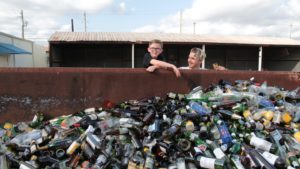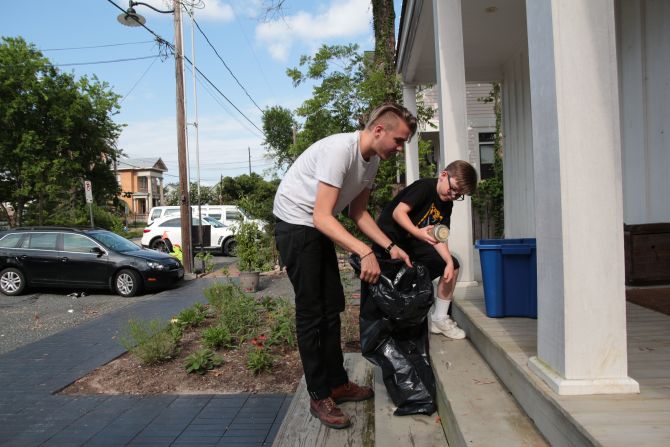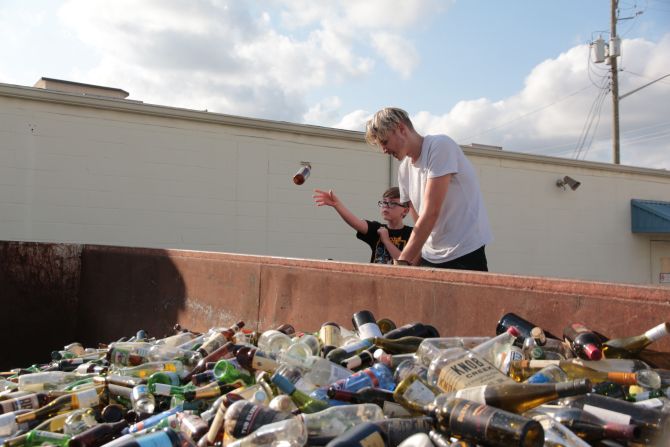Source: fusion.net
Published: May 25, 2016

HOUSTON—Eight-year-old Tristan “Pan” Berlanga never dreamed of starting his own business. “I’ve always wanted to be a basketball player,” he says as he and his business partner, 28-year-old David Krohn, drive through a neighborhood in Houston’s Old Sixth Ward.
Krohn slows the truck down, reading the house numbers out loud. The bed of his new pickup truck is already littered with empty beer and wine bottles loosely packed in boxes and bags. They stop in front of a gray house with a big double driveway and leave the truck running as they walk around the back. Moments later Pan returns wrestling a paper bag almost as big as he is. It’s filled with glass bottles. You can hear them clinking against each other as he hauls his load to the truck. “There is a lot more back there,” he says a little out of breath. “We could use your help.”
Pan and Krohn started their company, Hauling Glass, in April after the city of Houston decided to cut glass recycling from its curbside pickup program. Krohn, a friend of Pan’s family, came over one night talking about how the city was going to stop picking up glass. “I told David, why don’t we pick it up ourselves,” the third grader said. “And that’s how it started.”
With help from friends and family, the team goes door to door in Krohn’s pickup, collecting glass, and bringing it to an empty lot owned by Pan’s father. “Things just grew organically,” Krohn said. “We didn’t even know what we were going to do with the glass when we started.”
This uncertainty didn’t last long. Shortly after their story was featured in the local news, Strategic Materials, one of the largest glass processors in North America, contacted Krohn, offering to buy the glass from them.

Tristan “Pan” Berlanga and David Krohn picking up glass recycling in Houston’s Old Sixth Ward.
Houston removed glass recycling from its curbside pickup program in March after back-and-forth negotiations with Waste Management almost resulted in the end of recycling in the city altogether. Facing a $160 million budget shortfall, Mayor Sylvester Turner rejected two offers from the company responsible for picking up and processing Houston’s recycling because they were too expensive. Many feared that a deal would not be struck by the March 16 deadline, but at the last moment, Mayor Turner settled on a compromise—a $5.4 million, two-year contract that excluded glass, the most expensive material for recyclers to process.
“This agreement makes good economic sense for the city and for Waste Management,” Mayor Sylvester Turner said in a press release after the deal was struck. “It reaffirms our commitment to recycling, doesn’t tie the City to a long-term contract, allows Waste Management to avoid the employee layoffs that would have likely resulted from cancellation of service in Houston and provides an opportunity for potential competitors to enter the market.”
Houston is just one of many cities that have stopped picking up glass, part of a larger trend taking place across the nation. Faced with rising costs from recycling companies, cities like Santa Fe, New Mexico; Charleston, South Carolina; Harrisburg, Pennsylvania; and Baton Rouge, Louisiana have also eliminated glass from their recycling contracts.
The irony is that glass is infinitely recyclable. So why is it such a recycling pariah? To begin with, glass is heavy. It’s is more expensive to transport. It breaks and can contaminate other recyclables rendering them less valuable. Broken glass can also damage machinery or injure workers who have to sort through it.
Another part of the problem is that a lot of glass collected for recycling ends up contaminated. According to Vice President of Strategic Materials, Curt Bucey, a truckload of glass that arrives at one of Strategic Material’s processing plants can be up to 50% garbage—rocks, chicken bones, hypodermic needles, even bullets.
“Sorting through all that is like unscrambling an egg,” Bucey said. “It takes expensive equipment and labor.” To cover costs Strategic Materials now charges fees up to $50 a truckload based on how contaminated the glass is.
While glass has always been a poor economic performer for recycling companies, the current move away from glass in cities like Houston and Santa Fe is largely a reaction to a longtime downward trend in the commodities markets. Globally, plummeting oil prices, a strong U.S. dollar, and a slowing Chinese economy have sent the value of all recyclable materials spiraling. Facing major losses, recycling companies are tightening their belts, and as a result glass recycling is falling by the wayside.
The cost trickles down from recyclers to municipalities and ultimately to the environment. For a city like Houston, the fourth-largest in the United States, that means somewhere around 24 million pounds of glass that will now end up in a landfill each year unless residents haul it into one of the city’s glass collection centers themselves or pay $10 a month for Pan and Krohn to take care of it for them. Not only does this cause an immediate negative impact on the local environment, it can instill undesirable long-term habits that could prove difficult to reverse.
Melanie Scruggs, program director for Texas Campaign or the Environment, said that’s not enough. “We can’t just rely on people who are willing to pay extra to have their glass picked up,” Scruggs said. “We need the city and the state to create the right kind of environment to ensure that everyone has equal opportunity to recycle.”
Scruggs leads a coalition called Zero Waste Houston that advocates for a long-term, zero-waste plan for the city similar to those adopted by neighboring Dallas and Austin.
Houston is a long way away from zero waste, but Mayor Turner hopes that in two years things will be looking up for the recycling industry and that the city will be able to renegotiate a better contract that includes glass. In the meantime, enterprising individuals like Pan and Krohn are left filling the gaps.

Daniel Setiawan. Tristan “Pan” Berlanga tosses a glass bottle into into a metal bin the size of an 18-wheeler on an empty lot owned by Pan’s father.
“The demand has been insane,” Krohn says. Originally Pan and David started Hauling Glass thinking that it was something they could do in their neighborhood with a hand-drawn wagon. Now, only a month later, nearly 250 households in three different area codes have signed up for their service, and they hope to add a fourth area code this summer. They’ve hired two high school graduates to help them with the load, and Krohn is slowly phasing out his day job managing a warehouse to commit fully to the company.
David and Pan say they will keep running Hauling Glass for as long as they need to. At the end of their pickup run, they drive the truck full of glass to the empty lot owned by Pan’s father and chuck the day’s collection into a metal bin the size of an 18-wheeler. The bin is almost three-quarters of the way full and the two of them pause to admire the small mountain of glass they’ve managed to collect in just a little over a month.
“It’s pretty simple.” Krohn says. “We’re just trying to solve a problem that our community is faced with, and if this city does it again, then our job is finished.” They both admit that they would be a little sad when that day came. “It’s been an adventure,” Krohn says. “But really, we’d just be pretty happy that the city was recycling glass again.”
